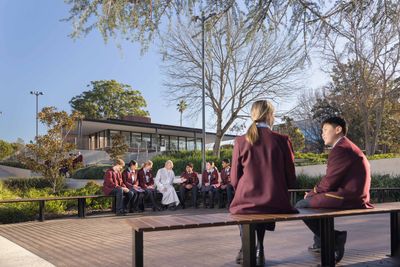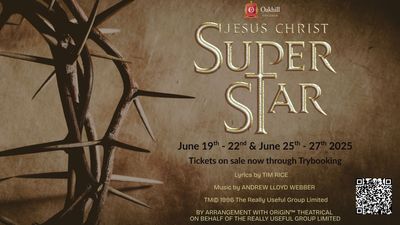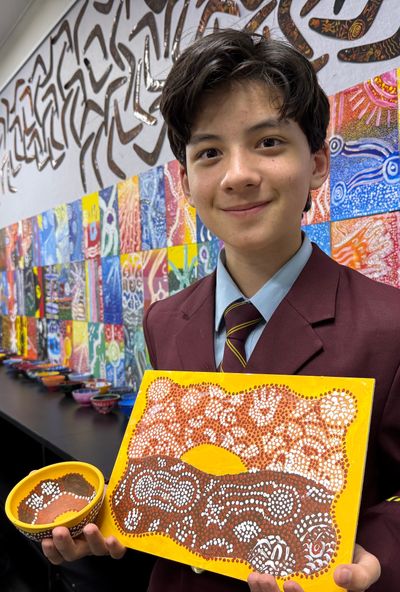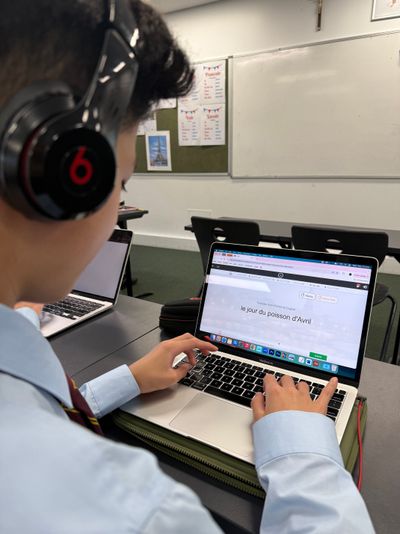From Br Steve Hogan fsc
Greetings,
"Fiction cannot make a reader moral or ethical or a kinder human being, however it can provide an opportunity for readers to identify and empathise with characters and situations, think critically about these same characters and events, and vicariously sort through the personal choices the narrative offers". (Dr Sands, Marlborough School, Los Angeles).
Reading may not make us more moral, but it can help. Reading can help us become more caring and confident, more resilient and adaptable, more ready and able to engage the real world. I find reading gives me an understanding and insight into the complexity of life. For example, I learn much about myself and others from reading about great leaders and orators such as Marcus Aurelias, John F Kennedy, Winston Churchill, Nelson Mandela, Lee Kwan Yu, and Barack Obama. I also learn much about myself and others from reading about history or countries or events. I learn to recognise human emotion and decision making. From fictional texts I learn to imagine and develop creative potential; I learn to imply, deduct, and induct ideas and visualise abstract concepts and notions.
Reading helps us develop our potential.
We need to preserve that practice of reading, discussing, analysing, and enjoying texts. There is a time and place to keep devices in the bag and for students to engage with texts and with each other. There is something also in holding a book and turning the page – it helps us remember what we have learnt because of where in the text, on the page, or within the whole book that we saw or learnt or discovered new meaning. This is also why this year we have reintroduced and are putting an emphasis on using exercise books for note taking and practice drills and homework etc. The interaction with the page and text helps our thinking, memory and recall.
Writing and speaking are the outputs or products of literacy whilst reading and listening are the inputs. This year ����Ӱ�� continues our ‘writing across the curriculum/academic writing’ strategy (the literacy initiative) to ensure we train all students in all subjects, with the skills needed for articulating and expressing their thinking, problem solving, and critical analysis in that subject. By better understanding the formulae, and the ‘how’ to write, students will be able to present their thinking better and achieve their potential in life, in NAPLAN and in the HSC (markers along the road).
For more about reading opportunities at ����Ӱ�� please refer to the College Library website .... Thanks to our librarian, Mrs Moriarty and her team, ����Ӱ�� has one of the best and most comprehensive school library services I have seen.

The College has also launched again this year the Reading Boost programme. More can be found about this on the College Library website or via this short video
Over the holidays, over 100 Year 9 and Year 10 students had a cross-border experience engaging in other cultures and other worlds through the Vietnam-Cambodia Service Tour. I have received emails from the public to inform and congratulate me on the conduct and composure, the presence, politeness and respect exhibited by our students; the professionalism of staff as carers; and the rapport shown between staff and students. I am humbled and honoured to receive such unsolicited comments, and it is a credit to these students and their families. May God continue to bless ����Ӱ�� and watch over us as families and as a school community to ensure we maintain the ethos and practice that continues to form such fine young people.

In March this year, Year 7 and Year 9 students participated in the online NAPLAN assessment tool. Hong Kong students take the Territory-wide System Assessment (TSA) and in New Zealand they have Asttle National Standards tests. I believe a national assessment tool is a good tool that can help teachers and schools better respond to the learning of each student and the learning needs of each cohort. With an objective standard we are able to identify trends and address them. We recently received our 2025 NAPLAN results for Numeracy, Reading, Spelling and Grammar & Punctuation and I am pleased to report that they are our best ever with improvement in all strands and in Year 9 there are no students in the lowest Band - Needing Extra Support - in most of the strands.
On Thursday 15th May, the College will celebrate Founders Day, our founder being St John Baptist de La Salle. In 1680 in Rheims, Champagne, France, St John Baptist de La Salle started Christian School’s, providing vernacular education for all regardless of wealth or status. His mother was Madam Moët, of Moët Champagne, and his father a lawyer for the Court of King Louis XIV. As an educated man St La Salle introduced the idea of classroom teaching and set up teacher training, writing many texts on good school management. It was his belief that the relationship between the teacher and student, and explicit direct instruction were the two key elements to quality learning outcomes as well as good order and good management. This is exactly what the experts are saying today. But in addition, De La Salle was concerned about the development of the person, forming good young men and women, good citizens, service oriented, so as to contribute to the mission of the church and one’s own salvific journey. This year is 345th year of the Lasallian schools and the 89th year of ����Ӱ��.

Today we also note and keep in our prayers, the new Pope elected overnight, Pope Leo XIV, an Augustinian priest from Chicago.
May I kindly bring to your attention the College Gala Day on Saturday 31st May. If you can help in any way please contact ... or pandf@oakhill.nsw.edu.au. There is more information in this newsletter. I look forward to seeing you there.
Br Steve Hogan
Principal























